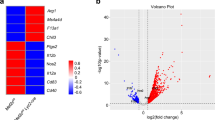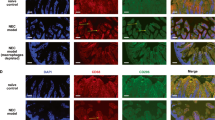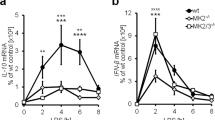Abstract
M-CSF is a key cytokine in macrophage development by inducing MAPKs activation, and cAMP can inhibit MAPKs activation induced by inflammatory stimuli. To explore the effects of cAMP on M-CSF-induced MAPKs activation and on macrophage development, the model of bone marrow-derived murine macrophages (BMMs) was used. The effects of cAMP on M-CSF-induced MAPKs activation were analyzed by Western blotting assay, and the effects of cAMP on CD14 and F4/80 expression during macrophage development were examined by FACS analysis. Macrophage morphology showed the successful establishment of the model of macrophage development. Western blotting assay revealed that M-CSF activated ERK, JNK and p38 in both mature and immature macrophages, and cAMP inhibited M-CSF-induced ERK, JNK and p38 activation in a time-dependent manner. FACS analysis revealed that macrophage development was impaired with cAMP pretreatment. In conclusion, cAMP modulates macrophage development by suppressing M-CSF-induced MAPKs activation.
This is a preview of subscription content, access via your institution
Access options
Subscribe to this journal
Receive 12 digital issues and online access to articles
$119.00 per year
only $9.92 per issue
Buy this article
- Purchase on Springer Link
- Instant access to full article PDF
Prices may be subject to local taxes which are calculated during checkout
Similar content being viewed by others
Author information
Authors and Affiliations
Corresponding authors
Rights and permissions
About this article
Cite this article
Zhu, N., Cui, J., Qiao, C. et al. cAMP Modulates Macrophage Development by Suppressing M-CSF-Induced MAPKs Activation. Cell Mol Immunol 5, 153–157 (2008). https://doi.org/10.1038/cmi.2008.19
Received:
Accepted:
Issue Date:
DOI: https://doi.org/10.1038/cmi.2008.19
Keywords
This article is cited by
-
Galanin is a potent modulator of cytokine and chemokine expression in human macrophages
Scientific Reports (2019)
-
Extracellular ADP facilitates monocyte recruitment in bacterial infection via ERK signaling
Cellular & Molecular Immunology (2018)



